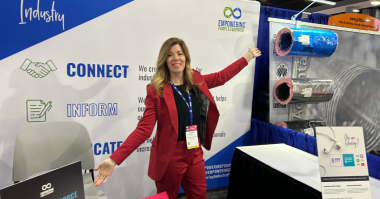While our industry may be a vital one, it isn’t always a glamourous one. So if like me you’re interested in writing for the web from a pumps standpoint, or any heavy industry, what is the best course to take? You want to walk the line between being informative without being tedious, being knowledgeable without being off-putting, etc. In order to help you bridge the gap, here are our top tips for writing for the web on an industrial topic.
1. Don’t be boring
It may go without saying, but if you take the time to look up industrial articles on the web, you’d be surprised at how many read in the same Ben Stein-ish voice. Sure, we’re not talking celebrity gossip or the latest trends, but we have chosen an industrial niche in which to devote our careers to, and if we can’t get excited enough to make the writing pop, our reader is going to pick up on that. For example, a pump with a cool new feature can be exciting for those of us in the industry, but taking the time to explain its benefits (lower waster, higher output, reduced costs, etc.) will showcase the pump in a way that everyone can appreciate.
2. Clarity counts
Many of our industries are very complex and can easily confuse a reader as to what is being written about. Given that confusion is the natural enemy of engaging writing, it is vital to make your writing as easy to understand as possible. For example, in this article on Pipe Strain and its Effect on Shaft Alignment, we have taken the time to explain what pipe strain is, the problems it can cause, how to prevent it, and even a real life example.
3. Don’t forget SEO (search engine optimization) terms and tricks
Writing about the aforementioned pipe strain or some other topic? Be sure you title and write your content in a way that will make it easily found by search engines. For example, someone writing an article on pipe strain should make sure these two words are in the page title, URL, meta tags, and even in a few of the headers. These are simple things that can get your article read and shared more, as well as bring attention to your website and the service or good it provides.
4. Noun vs. pronoun
Often when newbies attempt to write in an SEO friendly manner, they can often over clog their work with the key terms, which Google and other engines will take note of and penalize you for. A good rule to satisfy the recommended allowance for keywords is to switch being the noun and pronoun. For example, an article on pipe strain would go something like, “Pipe strain is one of the handfuls of phenomena that can complicate alignment. It occurs when pressure builds in the system. Conditions that can cause pipe strain include…” So what is the magic number for satisfying search engine criteria? It’s at about 2.5%, or 5 times in a 200 word article.
5. Link away
Unlike writing in printed materials where an asterisk leads to a source of information, writing for the web makes it remarkably easy to cite sources by linking to them. For example, if you want to discuss an unprecedented raise in the PMI (purchasing managers index) for manufacturing, be sure to link to your source. It will lend your site credibility, and you never know, the site you link to may reciprocate. The same goes for internal linking to products or services that you provide that have to do with the topic, past relevant articles, and be sure to end with a call to action that includes a link to your contact page or email.
And these are just a few general tips to keep in mind when writing for the web. Remember you are the authority on the topic you are writing about, so be confident, informative, and exciting.
If you like reading about digital marketing, please follow my posts here: https://www.linkedin.com/company/3764307
Note: I will be discussing this topic on the @PumpTurbo stage, September 24th in Houston! Join us at 4:30pm!





Comments